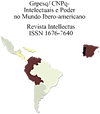Conhecimentos não Conhecidos: os limites do conhecimento científico e o seu (Des)Privilégio no conhecimento local africano
DOI:
https://doi.org/10.12957/intellectus.2024.81704Palavras-chave:
Ubuntu, Ujamaa, Conhecimento, MétodoResumo
Examino neste trabalho, a atitude científica, por meio do seu campo, conhecido como Conhecimento. Debruço-me em torno dos processos por intermédio dos quais a ciência considera válidos para legitimar o conhecimento. Dos argumentos de René Descartes, sobre o método científico, e das observações de Valéria Giannella sobre a construção da epistemologia a partir de uma outra abordagem; percebo que, a exploração da ciência não ocidental pela ciência ocidental, fez conflituar os interesses de produção científica, fazendo-lhe perder prestígio na África. Partindo, de “experiências e sentidos” (LARROSA, 2002) africanos, como Ujamaa (NHERERE, 1968), sugiro, uma reflexão em torno das metodologias caracterizantes da ciência, e a adaptação de meios que se desfaçam de modelos padronizados e localizados em ideologias ocidentais. Só assim, será possível o socialismo científico à luz das interconexões socioculturais.
Downloads
Referências
BERNECKER, S.; PRITCHARD, D. The Routledge Companion to Epistemology. London e New York: Routledge, 2011.
COPLESTON, F. A History of Philosophy: Greece and Rome. New York: Image Books, v. I, 1993. 534 p. 26
DESCARTES, R. Discurso Sobre o Método. Tradução de Maria Ermantina Galvão e Monica Stahel. São Paulo: Martins Fontes, 2001.
DUIKER, W. J.; SPIELVOGEL, J. J. World History. 6ª. ed. Boston: Wadsworth, 2010.
EZE, E. C. Reason and Culture: Understanding the African Experience. In: WALMSLEY, G. African philosophy and the future of Africa. United States of America: The Council for Research in Values and Philosophy, v. 14, 2011. Cap. 1, p. 11-22.
GADAMER, H.-G. Verdade e Método: Traços fundamentais de uma hermenêutica filosófica. Tradução de Flávio, Paulo Meurer. 3ª. ed. São Paulo: Vozes, 1999. 365 p.
GIANNELLA, V. Epistemoloque? Epistemologia para não Filósofos, Guiando a Ação para o Tempo que Vem., V, n. 1, Junho 2015. 339-354.
GONZALES, L. Racismo e Sexismo na Cultura Brasileira, 1984. 223-244.
HARAWAY, D. Situated Knowledges: The Science Question in Feminism and the Privilege of Partial Perspective, 14, n. 3, 1988. 575-599. Disponivel em: <https://www.jstor.org/stable/3178066>.
HEGEL, G. W. F. The Philosophy of History. Tradução de J Sibree. Canada: Batoche Books, 2001. 93-120 p.
HORD, F. L.; LEE, J. S. I Am Because We Are - Readings in Africana Philosophy. Amherst & Boston: University of Massachusetts Press, 2016.
HOUNTONDJI, P. J. Knowledge as a Development Issue. In: WIREDU, K. A Companion to African philosophy. Australia: Blackwell Publishing, 2004. p. 529-537.
KUHN, T. S. A Estrutura das Revoluções Científicas. 5ª. ed. São Paulo: Editora Perspectiva, 1962.
LARROSA, B. J. Notas sobre a experiência e o saber de experiência, Espanha, 12, Abril 2002. 20-28. Disponivel em:
<https://www.researchgate.net/publication/26421823_Notas_sobre_a_experiencia_e_o
_saber_de_experiencia>. Acesso em: 16 Dezembro 2023.
LENNOX, J. God´s Undertaker: Has Science Buried God? 2ª. ed. England: A Lion Book, 2009. 226 p. Disponivel em:
<https://archive.org/details/Lennox4/page/n1/mode/2up>. Acesso em: 24 Março 2024.
LENNOX, J. Can science explain everything? 1ª. ed. UK: The Good Book, 2019. 115 p. Disponivel em: <https://archive.org/details/can-science-explain-everything-john- lennox/page/n1/mode/2up>. Acesso em: 14 Março 2024.
LYNCH, M. P. Truth. In: BERNECKER, S.; PRITCHARD, D. The Routledge Companion to Epistemology. London e New York: Routledge , 2011. Cap. 1, p. 4-13.
MENESES, M. P. G. Corpos de violência, linguagens de resistência: as complexas teias de conhecimentos no Moçambique. In: SANTOS. BOAVENTURA, D. S.; MENESES, M. P. G. Epistemologias do Sul. São Paulo: Cortez, 2013. p. 182-214.
NGOMANE, M. Every Day Ubuntu, Living Better Together, the african way. New York: Harper Design, 2020.
NHERERE, J. K. Ujamaa - Essays on Socialism. Dar es Salaam: Oxford University Press, 1968.
ROSA, I. S. C.; ALMENIDA, R. O. D.; SANTANA, C. S. C. Universalismo, Pluralismo Epistemológico e Multiculturalismo Crítico: Problematizando a Possibilidade de uma Nova Posição Epistemológica, 13, 11 Dezembro 2020. 726-742. Disponivel em: <http://periodicos.ufpb.br/ojs2/index.php>. Acesso em: 27 Dezembro 2023.
SANTOS, B. D. S. Um discurso sobre as ciências. 5ª. ed. São Paulo: Cortez Editora, 2008.
Downloads
Publicado
Como Citar
Edição
Seção
Licença
Copyright (c) 2024 Cleiton Fernando Pinto Celestino

Este trabalho está licenciado sob uma licença Creative Commons Attribution-NonCommercial-ShareAlike 4.0 International License.
Autores que publicam nesta revista concordam com os seguintes termos:
Os autores mantêm os direitos autorais e concedem à revista Intellèctus o direito de publicação, sob uma Licença Creative Commons Atribuição 4.0 Internacional, a qual permite que outros distribuam, remixem, adaptem e criem a partir do seu trabalho, mesmo para fins comerciais, desde que lhe atribuam o devido crédito pela criação original.
Os dados e conceitos abordados são da exclusiva responsabilidade do autor.
A revista Intellèctus está licenciada com uma licença Creative Commons Atribuição 4.0 Internacional





